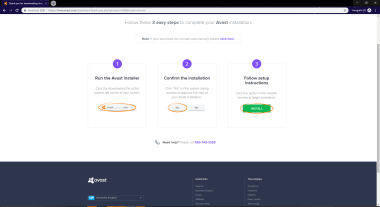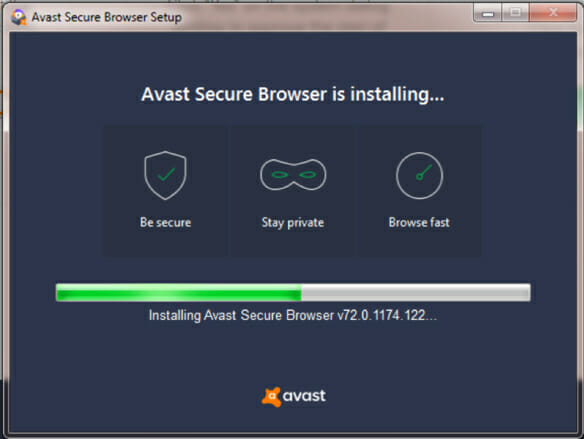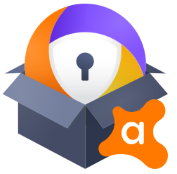
- #WHY DID AN AVAST SECURE BROWSER DOWNLOAD CRACKED#
- #WHY DID AN AVAST SECURE BROWSER DOWNLOAD INSTALL#
- #WHY DID AN AVAST SECURE BROWSER DOWNLOAD SOFTWARE#
- #WHY DID AN AVAST SECURE BROWSER DOWNLOAD CODE#
- #WHY DID AN AVAST SECURE BROWSER DOWNLOAD PC#
This license is commonly used for video games and it allows users to download and play the game for free.
#WHY DID AN AVAST SECURE BROWSER DOWNLOAD SOFTWARE#
There are many different open source licenses but they all must comply with the Open Source Definition - in brief: the software can be freely used, modified and shared. Programs released under this license can be used at no cost for both personal and commercial purposes.

#WHY DID AN AVAST SECURE BROWSER DOWNLOAD CODE#
Open Source software is software with source code that anyone can inspect, modify or enhance. Freeware products can be used free of charge for both personal and professional (commercial use).
#WHY DID AN AVAST SECURE BROWSER DOWNLOAD INSTALL#
Keeps you safer by blocking unwanted add-ons or plugins, while letting you install the ones you know and trust.Ĭleans your browser history, cached images, cookies, and other junk with just one click, to keep your activity private and free up disk space.Īutomatically blocks Flash-based content from running, unless you choose to allow it, to stop it from hogging computer resources.įreeware programs can be downloaded used free of charge and without any time limitations. Safely store, create, and autofill your login credentials for your favorite sites. Prevents your browsing history from being stored and dumps any tracking cookies or web cache you pick up during that browsing session.įorces supported websites to use encryption, hiding all data sent to and from your browser, so that no one else can read it. Protects your privacy by preventing websites, advertising companies, and other web services from tracking your online activity.
#WHY DID AN AVAST SECURE BROWSER DOWNLOAD PC#
Stops ads to help webpages load faster while giving you the flexibility to choose whether you block everything, or just the more aggressive and intrusive ones.īlocks malicious websites and downloads to prevent your PC from becoming infected with viruses, spyware, and ransomware. Stops websites from identifying you by hiding your unique internet browser profile (browser version, language, timezone, add-ons, etc.).

Prevents snoopers from eavesdropping on you and allows you to change your location, to access content not available in your own country. I recommend you to turn this off if you value internet privacy.Prevents hackers from seeing what you type so they cannot steal your passwords, credit card numbers, and other personal data. There is a checkbox in “preferences” in Avast that says “scan secured connections”.

#WHY DID AN AVAST SECURE BROWSER DOWNLOAD CRACKED#
(2) Unsecure website certificates (maliciously exchanged, cracked or shared with third-parties) will be accepted by your browser and the whole concept of secure, encrypted and authenticated connections is ignored. (1) Man-In-The-Middle attacks by any person exchanging the website's keys to their own so that they may tap in on your connection will go unnoticed by your browser. This completely compromises internet privacy. There is no other way for Avast to decrypt the connection than to generate its own certificate with a known derived decryption key, then signing them with a custom Root Certificate from Avast installed on your system. Scanning encrypted SSL/TLS sockets requires that Avast can decrypt the connection. This is happening because as others described, the Mail/Web shield needs to be able to scan your web traffic before it is saved on your system / does any harm.

If it worries, you, you can disable this behavior - go to Settings>Active Protection>Web Shield>click on "customize" and tick the box next to "Disable HTTPS scanning." If you do this, avast! won't be able to proactively block malware on HTTPS sites. Whether this behavior presents additional security issues is debatable but I don't think it's something you need to be deeply concerned about - after all, your own antivirus software is doing the man-in-the-middling, not a malicious party. I'm guessing this is what avast! is doing. The solution that many antivirus programs use is to install its own SSL certificate as a root certificate so that it can essentially man-in-the-middle all HTTPS traffic to scan for malware. This presents a risk because if you download a virus, the antivirus software won't know about it until the download is finished and the virus is already saved to your hard drive, allowing criminals to bypass the "live defense" features of AV by simply hosting the malware on an HTTPS site. As useful as it is, HTTPS presents a bit of a problem to antivirus software because when you visit sites over an encrypted connection, your antivirus software cannot see what sites you're visiting or what files you're downloading, at least until the download finishes. The whole goal of HTTPS is to prevent eavesdropping so that anyone monitoring your web traffic can't see what you're sending.


 0 kommentar(er)
0 kommentar(er)
